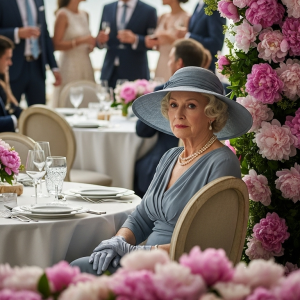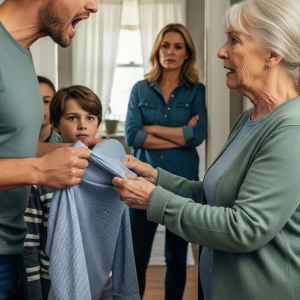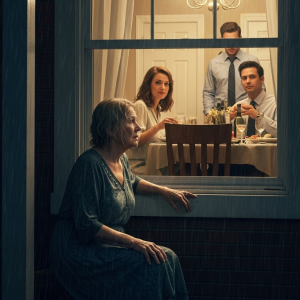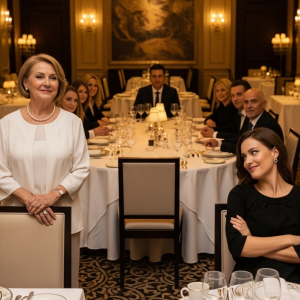The morning had started just like any other. I brewed a cup of chamomile tea, the steam warming my tired hands. I carefully wrapped my grandson Ethan’s scarf around his neck, the way he hated but I knew would keep him warm against the biting wind. As a final touch, I tucked a chocolate chip cookie into my coat pocket for him, a small, secret comfort in case his day turned sour.
I remember tipping the usual two dollars at the café, where the radio always played too low to hear. But that day, I caught the forecast through the static: “Light snow tonight in Cain County, temps dropping to 15°.” I should have taken it more seriously. I should have stayed home. But Ethan was waiting for me, and my world had revolved around his for years.
By two-thirty, the sidewalks around Maple Falls Elementary were a treacherous mirror of black ice. I rushed anyway, my worn boots and bad knee protesting with every hurried step. Near the flagpole, my foot slipped. A quick, sharp sting, and then a deep, searing burn shot up my leg as I went down hard. I gritted my teeth, pulling myself up before anyone could see the old woman who had fallen.
My pants were torn at the knee, and dark blood was already seeping through the fabric. But Ethan was waiting. He always expected me.
He barely looked up when I called his name, just tossed his heavy backpack at me and walked ahead like a little general, leaving me to limp behind. The cold sliced through my thin coat, my scarf now too loose to offer any warmth. He didn’t ask why I was walking so slowly. He never did.
I had barely managed to shut the door behind us when my son Matthew’s voice cut through the living room like a whip. “You’re ten minutes late. He was standing outside like an orphan.”
I blinked, trying to catch my breath. The pain in my knee was a throbbing drumbeat. “I… the sidewalks are…”
“That’s not okay, Mom,” he snapped, pulling his AirPods out as if I had interrupted something sacred. “You have one job.” Ethan dropped his shoes by the door and stomped off, shouting something about his iPad being dead. From the hallway, my daughter-in-law, Melissa, emerged, her expression tight. She didn’t even look at my face.
“Is dinner going to be ready soon? I told Ethan we’d eat early tonight.” My leg pulsed beneath the wet, torn fabric. I opened my mouth to explain, to tell them about the fall, the blood, the ice. But then I closed it. There was no point. They weren’t listening. I walked past them, silent, dripping melted snow and blood onto their pristine hardwood floor.
In the bathroom, I peeled away my pants. The gash on my knee was angry and red, the blood dried in strange, dark patterns like the branches of a winter tree. I carefully cleaned the wound, dabbed it with ointment, and wrapped a fresh bandage around it. The skin throbbed with each beat of my heart.
From upstairs, I could hear Ethan’s laughter echoing through the house, the tinny sound of YouTube videos blaring. Downstairs, the hum of the television filled the space with a meaningless drone. I stood in the quiet of the hallway for a moment, an invisible ghost in the home I helped maintain, before changing into dry clothes and shuffling to the kitchen.
No one had bothered to set the table. The sink was piled high with dishes from their lunch. I ignored them and boiled a small pot of soup, just enough for one. No one asked what I was cooking. No one asked why I was only cooking for myself.
I ladled my dinner into a chipped blue bowl and sat at the far end of the table, alone. Across the room, Melissa scrolled through her phone on the couch. Matthew tapped away at his laptop, AirPods firmly back in place. I wasn’t sure if he was working or just performing the act of not seeing me. The only warmth in the room came from the steam rising from my soup.
Then I heard it, spoken softly but with enough clarity to shatter the silence. “She’s becoming more of a burden every day,” Matthew muttered. He might have been speaking to Melissa, or he might have just been thinking aloud. She didn’t respond, just nodded vaguely, her eyes still glued to her screen.
I lowered my spoon, my hand trembling so badly the broth sloshed over the side of the bowl. Burden. The word landed with more force, more pain, than my fall on the ice ever could. It was a heavier weight than I had ever carried.
I finished my soup, washed my single bowl, and dried it with a towel embroidered with faded sunflowers, one Ethan used to love when he was small enough to still need me. In the quiet that followed, I sat in the dark kitchen for a long time, my fingers tracing the outline of the bandage on my knee. “I wasn’t always this invisible,” I whispered to the empty room.
The next morning, I made Ethan’s favorite blueberry pancakes. He asked if we had Pop-Tarts instead.
Melissa breezed into the kitchen a few minutes later, perfectly made-up. “Still doing the whole ‘made from scratch’ thing?” she chirped, laughing lightly. “Honestly, you still shop like it’s 1985.” She was gone before I could respond, her phone already pressed to her ear.
I poured my coffee, the ache in my knee a constant, throbbing reminder of my fall, of my invisibility. The snow was falling again, a gentle hush blanketing the world outside. I decided to find the holiday plates Melissa had mentioned. They were in the basement, a place filled with the ghosts of a life I barely recognized.
The air downstairs was musty with the scent of cardboard and forgotten things. I moved past old boxes, a yellowed baby swing, a cracked vase I always meant to glue. Tucked behind a stack of dusty tins, I found them. And that’s when I saw it. The corner of a pale green tin box, painted with faded pink roses. My heart stopped. The recipe box. I hadn’t opened it in decades.
The latch creaked as I lifted the lid. Inside sat dozens of index cards, their edges softened by time. My handwriting, my mother’s, and even a few in my late husband Carl’s blocky script. My fingers brushed over the familiar titles—Apple Crumble, Baked Mac and Cheese, the Strawberry Jam Cake Ethan never liked but I made every Christmas anyway.
Then I found it. Tucked behind a recipe for lemon bars was a yellowing, folded note. The ink was faint, but I didn’t need to read it. I knew every word by heart. Thanks for keeping me alive, Helen.
Carl had written it after his first heart surgery. I had nursed him for weeks, cooking bland, salt-free meals, nagging him to take his medicine. He called me a nag to my face, but one night, he slipped that note into the recipe box for me to find. He never said the words out loud. He didn’t have to.
I pressed the fragile paper between my hands, a sacred relic from a time when I was seen, when my care was acknowledged. I sat on the cold basement steps, the tin box in my lap, and wept. It was a quiet, desolate cry, the kind that doesn’t shake the shoulders but sears the soul. I was grieving not for Carl, but for the woman I used to be. The woman he saw.
Later, I carried the tin upstairs and sat on the porch, letting the cold numb my hands. My neighbor, Nancy, saw me from her yard and came over with a warm jar of peach preserves. “Just feeling the cold today,” I lied, hiding my tear-stained face. She didn’t push, just sat with me, the warmth of the jar a silent offering of comfort between us. Even a near-stranger could see more than my own family did.
The annual tree-lighting ceremony was that afternoon. Ethan’s class was singing “Jingle Bell Rock.” He was excited, until I made a mistake. In the chaos of the morning, between making cinnamon rolls and fulfilling Melissa’s request for a non-fat latte, I had forgotten to iron his white choir shirt.
Matthew’s voice exploded from the hallway. “Where’s the damn shirt?” He stormed into the kitchen, waving the wrinkled shirt like a declaration of war. “You had one job, Mom. One thing to remember!”
Ethan stood behind him, his small face a mask of disappointment. “You ruin everything,” he said. His voice wasn’t angry; it was flat, matter-of-fact, a simple statement of truth as he saw it. That was the blow that finally broke me.
Melissa appeared, arms crossed. “You said you had it handled, Helen.” Their words were stones, and I was drowning beneath their weight. I couldn’t look at them. I turned off the oven, the sweet smell of the half-baked cinnamon rolls turning my stomach. The shouting faded into slamming doors. The house fell silent, colder than the winter air outside.
I walked upstairs and pulled down my old navy suitcase. I packed two changes of clothes and a worn photo of Carl and me from a Fourth of July picnic. We looked so young, so unaware of the life that was to come. I stood in the hallway, looking at the family photos that didn’t include me, the empty hooks that were never used for my coat.
Then I went to the kitchen and sat down with a pen and paper. I didn’t write a list of grievances. I didn’t fill the page with my anger or my pain. I just wrote questions.
Did you ever see me? Did it ever matter when I smiled, or cried, or bled? Did you know I used to dance in the kitchen when no one was home?
I didn’t sign it Love, Mom. I just signed, Mom. I placed the letter in the center of the kitchen table and weighed it down with a coaster that read, Home Is Where Your Story Begins. My story, I realized, had to begin somewhere else.
Nancy was waiting in her driveway before sunrise, a travel mug of warm cinnamon tea ready for me. As I climbed into the car, I slipped my precious recipe box into my bag. It felt heavier than it ever had before.
At the bank, the manager, Mr. Howard, greeted me with a kind smile. He remembered me from when Carl was alive. “You always handled everything for him, didn’t you, Mrs. Langley?” he said gently.
I explained that I wanted to freeze the joint account Carl had left me—the one I had recently discovered Matthew had been dipping into for the past year. Mr. Howard didn’t ask a single question, just handed me the forms. As my pen scratched across the paper, I felt a lifetime of weight lift from my shoulders. It wasn’t about the money. It was about the principle.
When we walked out, the sun was rising. In my lap, I clutched the recipe box like a life preserver. “I hope they read the letter,” I whispered to Nancy. “But it’s not for them. It’s for me.”
Back in the house, Matthew burst through the door, yelling for his breakfast. “Mom! Mom, where are you?” Melissa entered the kitchen, phone in hand, and stopped dead. She saw the letter on the table. Before she could touch it, the phone rang.
It was the bank. Matthew’s face twisted in confusion as he listened. “Wait, what do you mean, frozen? She did what?” His voice dropped to a choked whisper.
Melissa’s trembling fingers unfolded the letter. She read the first line, then the second. Her face went pale. She looked up at Matthew, her eyes wide with a terror she had never known. “She’s gone,” she breathed. “She actually left.”
It took a week for my ears to adjust to the quiet. Nancy’s late sister’s cottage was small, and the heater rattled like an old man’s cough, but the silence was a balm to my soul. We spent the first few days scrubbing and cleaning. “Baking will warm the place up,” Nancy said, and I knew she was right.
I used to bake to fill the time. Now, I baked to bring myself back to life. The smell of cinnamon rolls and apple pie drifted out the window. By Saturday, we had a small stall at the local farmers’ market. I was nervous, but people smiled. They came back.
One of them was Mr. Hank, a kind-eyed veteran with a cap that read ‘USAF.’ After his first bite of a cinnamon roll, he looked at me and said, “This tastes like 1947.” He came every Saturday after that, always buying two rolls. “One’s for the road,” he’d say. “The other is for my wife. She passed in ’08. I eat hers for her now.”
One evening, I found a voicemail on the tablet Nancy used for orders. It was Ethan. His voice was small and scratchy. “Grandma… I miss you. Mommy says you’re busy. I told her your pancakes are better than Pop-Tarts. I don’t care if they’re burnt. I hope you come home.”
I didn’t cry, but my chest felt like it had caved in. The pain of his words was a physical thing. Later that night, Nancy looked at me and said quietly, “My son hasn’t called in three years. I guess we raised them too well, huh?” We both laughed, a sad, hollow sound in the quiet cottage. In the silence, I whispered to myself, “I used to make pancakes no one wanted. Now strangers line up for my bread.
Three months passed. The cottage became a home. Our little baking business thrived. I wore my favorite floral blouse, one I used to save for special occasions that never came. The spring fair was in full swing when the knock came.
I opened the door. It was Matthew. He stood there, looking lost and disheveled. Melissa was behind him, pale and tired, clutching Ethan’s hand.
“Hi, Mom,” Matthew said, his eyes unable to meet mine. “We didn’t know where else to go. Ethan… he talks about you all the time. He keeps asking for your pancakes.”
Ethan peeked out from behind Melissa’s legs. “I’m sorry, Grandma,” he mumbled, his eyes shiny with unshed tears.
I stepped out onto the porch, closing the door firmly behind me. The sun was warm on my back. “I loved you all,” I said, my voice steady and clear. “I still do. But I will not live unloved anymore.”
They stood in stunned silence as I turned and walked back into my new life, the scent of nutmeg and lemon glaze welcoming me home. At the fair, a woman approached me, holding a loaf of my honey wheat bread. “I saw your video,” she said, referring to a talk I’d given at the local community center. “Your strength helped me leave, too.”
I watched Matthew’s car pull away, Ethan’s small face pressed to the window. He waved. I waved back. Then I turned to Nancy. “Let’s bake something new tomorrow,” I said. For the first time in years, every step I took felt like my own.




